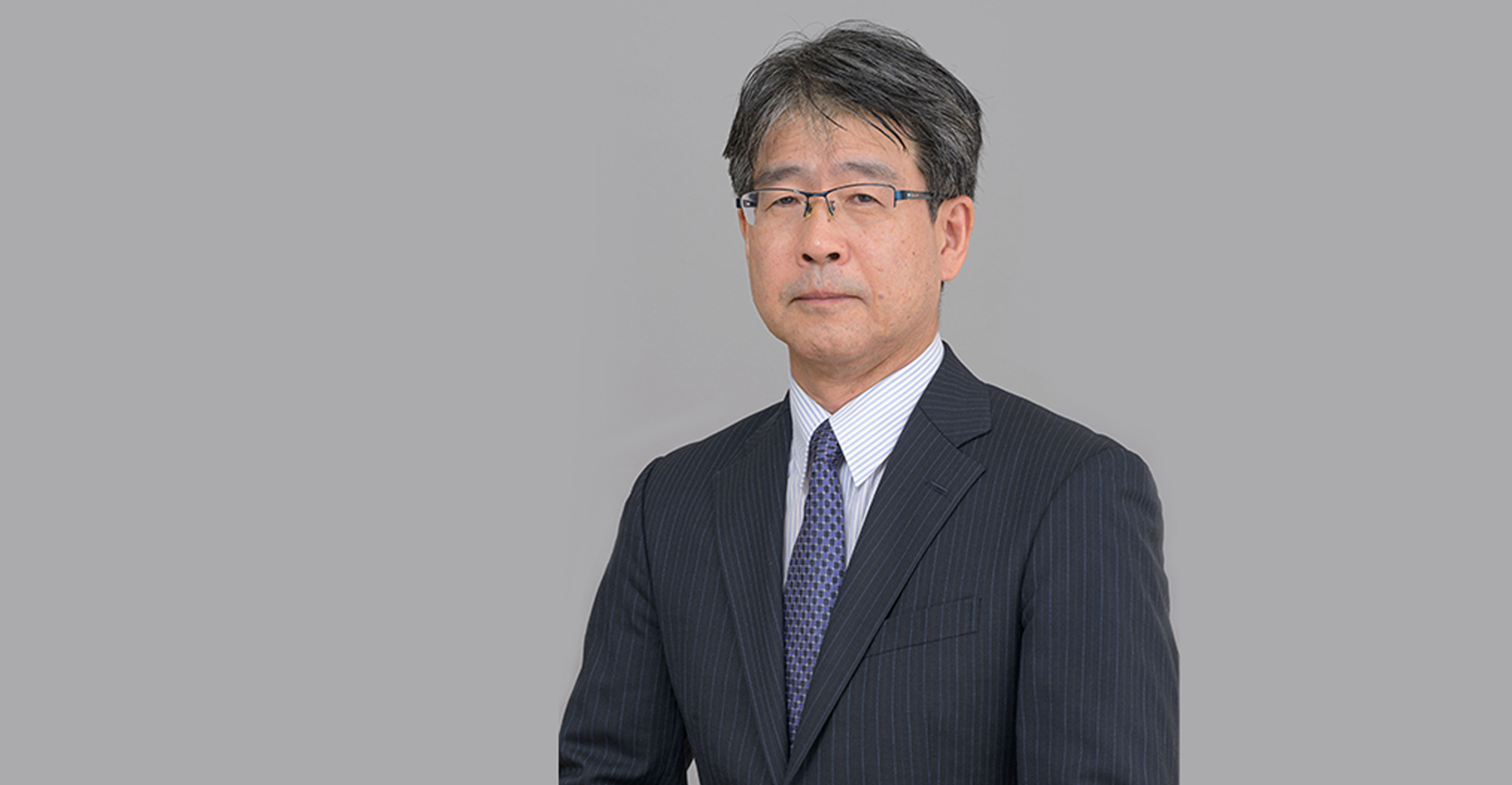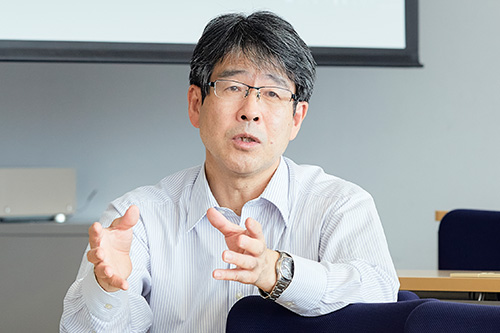Message

"Leading Japan as a business school"
Dean of the Graduate School of Business Administration, Keio University
Dean of the Keio Business School
Hiroshi Nakamura
What is KBS?
The Keio Business School (KBS), founded in 1962, is the first dedicated business school in Japan. KBS was started with the aim of training business management personnel through short-term seminars and one-year programs. In 1978, KBS established Japan's first program to award an MBA (Master of Business Administration), and in 1991 KBS started a doctoral program to train professional researchers. Furthermore, an Executive MBA (EMBA) program was launched in 2015 for working professionals seeking to refine their management skills.
The school has been referred to as "KBS" since its founding, and currently encompasses both the Graduate School of Business Administration at Keio University (offering programs that confer MBA and PhD degrees) and the Keio Business School (offering short-term executive seminars).
The role KBS plays in the economic world
Rapid changes to the global economy — such as accelerated globalization, the spread of information technology (IT), demographic shifts, and the growth of developing countries — have required smart decision-making from a management perspective to be more directly connected to the development and survival of companies and organizations than ever before. Taking the correct course of action in dynamic situations — such as the globally-minded management of overseas offices, collaboration with companies and organizations operating in new business domains, and acquisition-making — may prove difficult when relying on one’s own limited work experiences or in-house on-the-job training alone. The need to engage in specialized study of management and acquire practical skills is increasing. In such an environment, we at KBS believe that the role of business schools will become more crucial as times change.
KBS mission and program features
KBS's mission is to develop leaders who can think of new concepts and make them a reality. Here at KBS, we provide an environment where scholars and students from diverse backgrounds find enjoyment in learning together, delivering world-class research, and integrating academic theory with real-life business experience.
To achieve the above mission, the KBS programs have the following notable features.
(1) Practical education centered on the case method
(2) Curriculum to enhance "knowledge and practical skills in overall management times expertise"
(3) International connections
(4) Linkage with other graduate schools at Keio University
(1) Practical education centered on the case method
The first feature is practical education centered on the case method. "Cases" are teaching materials that describe management issues faced by actual companies and organizations. Students read cases in advance and present, led by faculty, the results of their analyses, decisions, and the reasons for them, followed by further discussion. In Japan, when one thinks of education, they tend to imagine a format in which teachers lecture and students learn purely by listening. However, interactive teaching methods are extremely effective for acquiring practical management skills. It is equally important that the people in the classroom come from diverse backgrounds and occupations. This is because new insights are born from diverse gatherings of people. Through the process of explaining and discussing their own ideas in each case discussion, students are able to not only gain knowledge, but also develop a sense of leadership and mission towards management.
Learning through the case method is not only practical, but also effective for creating systems of knowledge across disciplines. For example, the implementation of a given strategy requires the simultaneous application of knowledge across multiple areas, including organizational change, dealing with uncertainty, specific operational planning, and analysis of the business conditions. Organizational and personnel changes require funds, in turn affecting a company's finances and accounting. In this kind of complex management situation, a level of managerial ability is required to apply a system of knowledge promptly and accurately from various fields.
Of course, cutting-edge knowledge in each specialized field is also important, and KBS is home to a full-time faculty of leading researchers who are active in their respective fields in all specialized areas related to management. These faculty members create and prepare case materials based on their own research activities and lead case discussions. This results in case method content that is academic, backed by theory, and systematic. We believe this is a significant feature that distinguishes our program from other programs that gather experience-based content.
Programs that allow you to focus on thinking
The curriculum at KBS is designed for students to focus on learning and thinking about management for a set period of time. Most business schools in Japan have students attend classes in the evening on weekdays. However, with the case method, it is important for students to spend the entire day, from morning to night, concentrating on preparing for class, engaging in discussion, and then reviewing and organizing what they have learned systematically.
Therefore, evening classes on weekdays, which would only further burden tired minds after work, do not make up the core of the KBS curriculum with exceptions. In addition to the full-time MBA program, which has classes primarily during the daytime on weekdays, there is an EMBA program with a Saturday-based curriculum. The Executive Seminar also consists of seminars that are held exclusively on Saturdays and in hotels where participants stay overnight for a certain period of time.
(2) Curriculum to enhance knowledge and
practical skills in overall "management times expertise"
Even if one develops expertise in some areas, without knowledge and practical skills in overall management, they will not be able to capitalize on that expertise. KBS aims not only to systematically enhance knowledge and practical skills in overall management, but also to produce graduates with a high level of expertise in one or more areas (the so-called "T-shaped", or "multi-specialty" human resources).
To this end, we conduct lectures using the case method in all eight areas (production, accounting, information and decision-making, organization and management, marketing, business environment, finance, and general management), as well as provide a full range of specialized courses in each area of expertise.
To further develop students’ expertise, the full-time MBA program conducts master's thesis preparation seminars, and the EMBA program facilitates students’ individual research.
(3) International connections
The third feature of the KBS programs are their international connections. It goes without saying that the economic world is rapidly globalizing. In order for individuals to thrive in the global society of the future, they will need not only to improve their English skills, but also develop an international mindset; they must be able to listen to others’ opinions and confidently express their own in the context of diverse cultures with different customs and lifestyles.
KBS works with top schools around the world, not only in Europe and North America, but also in Asia, Africa, and Latin America. Our exchange program boasts partnerships with 48 of the world’s top schools (as of September 2023), making the "KBS campus" international by not only allowing students to study at the business school of their choice outside of Japan, but also by accepting a large number of international students from our partner schools. Furthermore, our Double Degree Program, which is affiliated with three overseas schools, allows students to earn degrees from two graduate schools in as little as two years. This program involves lengthier study abroad periods (9 months to 1 year), which allows students to acquire a solid international perspective through long-term exposure to different cultures. We also actively participate in joint programs with top business schools in China and Korea, the Council on Business and Society (which brings together nine top business schools from Japan, North America, Europe, and South America to discuss business and society), and the EMBA Consortium (an educational partnership organization consisting of 10 top business schools from around the world).
Moreover, KBS continues to receive international accreditation from the Association to Advance Collegiate Schools of Business (AACSB International) in the United States and is active in international organizations such as the Association of Asia-Pacific Business Schools (AAPBS), Partnership in International Management (PIM), and the European Foundation for Management Development (EFMD).
(4) Linkage with other graduate schools at Keio University
The final feature of KBS programs is linkage with other graduate schools at Keio University. While KBS students can of course take courses offered by other graduate schools, we also offer a dual degree program in collaboration with the Graduate School of Medicine, the Graduate School of Health Management, and the Graduate School of Pharmaceutical Sciences that allows them to earn two degrees in three years. Furthermore, since knowledge of law is essential for business, we have established a number of courses in partnership with the Law School. In addition, from the 2023 academic year, as a university-wide initiative that transcends the boundaries of graduate schools, we are establishing shared graduate school courses on themes such as data science and the environment.
Final message
The economic world is becoming more international every day. In this business environment, there is a growing need for management personnel who can think of new concepts and make them a reality. At KBS, we will continue to evolve in order to produce as many business leaders as possible who will lead the way in challenging times. For the future of Japan and the entire world, we eagerly anticipate that many individuals will come knocking on the gates of our graduate school.

